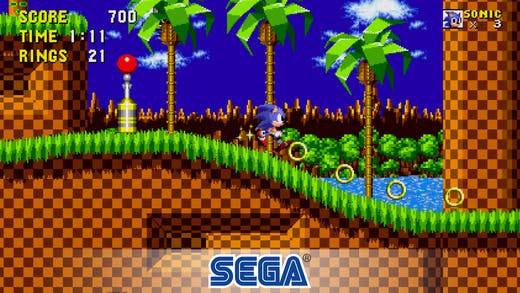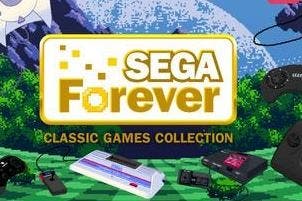Sega releases classic games on mobile, for free, but at what cost?
Unity ports run much worse than older emulation, even on high-end devices.
Sega has released five of its classic games as free mobile ports on iOS and Android. These include: Sonic The Hedgehog, Phantasy Star 2, Comix Zone, Kid Chameleon, and Altered Beast.
This new line-up is part of what the publisher calls Sega Forever, a new initiative to get its best retro games available for a mobile audience. More titles will be added each month.
All games are completely free with ads, though these can be disabled should one spend a one-time payment of £1.99.
One appealing feature about this Sega Forever line-up is that these games offer modern features like cloud saves, leaderboards, and Bluetooth controller support.
Some of these games were already available on mobile, such as Altered Beast, Phantasy Star 2, and Sonic The Hedgehog. If you owned these games before, you should be able to get the updated ad-free versions of them at no additional cost, though we've found this feature isn't working for Sonic where the "recover purchase" simply times out. We're not alone in this either, as Touch Arcade reported the same problem.
That's only the tip of the iceberg, however, as there's a much bigger problem with this Sega Forever line-up: these ports offer significantly worse performance than that of their older versions, even on more modern hardware.
Allegedly this is because these retro classics were ported over in Unity. Our Digital Foundry tech aficionado John Linneman said "Do not touch those Sega Forever games," noting that they're "lousy emulation in a Unity wrapper".
"The games are designed to run at 60 frames per second. This emulator tries to do that but drops frames resulting in something that looks more like ~45 fps or so. There are loads of dropped frames, hitches and skips," he said.
"30fps is bad, but an even, stable 30fps would have been better than this. The issue here is that it skips and stutters during gameplay. And when a notification occurs, it gets much worse. So it never plays smoothly."

Even weirder is that these low-tech titles played far better on older hardware, due to more optimised emulation. "iPhone 3GS could play those old apps at a full 60fps while iPhone 6S+ with the new apps cannot," Linneman explained.
"To put it into perspective, Sega had previously released versions of many of these Genesis games on iOS that were emulated. Those could run at 60fps on an iPhone 3GS in 2009. Eight year later and they run worse on much faster hardware due to an un-optimised emulator."
He postulated that another emulator, RetroArch, would have been a much better fit for the project, though its developer Libretro said it couldn't reach an agreement with Sega on its terms of service.
"Sorry to all the people that are experiencing subpar performance with this Unity thing," the RetroArch devs tweeted. "They could have been using RetroArch right now if they hadn't been so stubbornly insistent on demanding we relicense our entire program to something that would strip us of all our rights, on top of some other unreasonable things like not showing any branding, etc. Hell, they could have had this running on the desktop right now on top of consoles and maybe some netplay as well. Oh well..."
So why did Sega go with Unity instead of RetroArch? "About 90 per cent of the games so far are in Unity," Sega Networks' chief marketing officer Mike Evans explained in an interview with GamesIndustry.biz. "The reason we chose Unity as middleware is it enables us to take this content to other platforms as well."
"So my first focus is mobile. It's a huge project and what I really want to do is get mobile right. After this, there are options: we can look at desktop, Facebook, we could even take these games to consoles like Switch."
Linneman, however, wasn't buying this explanation. "If they had taken the RetroArch path, it could easily have worked across any platform they wanted to port it to," he told me.
We've posed the question to Sega as to why it went with Unity and why these newer versions of games on contemporary hardware can't run as smoothly as they did on archaic tech. We'll update as we hear back.
As for RetroArch, developer Daniel De Matteis offered Eurogamer the following explanation as to why it couldn't come to terms with Sega on this project:
This problem of new tech running old titles at worse performance on mobile is threatening to become an unfortunate new trend as a similar thing happened with classic Mega Man games on mobile earlier this year.





.png?width=291&height=164&fit=crop&quality=80&format=jpg&auto=webp)




